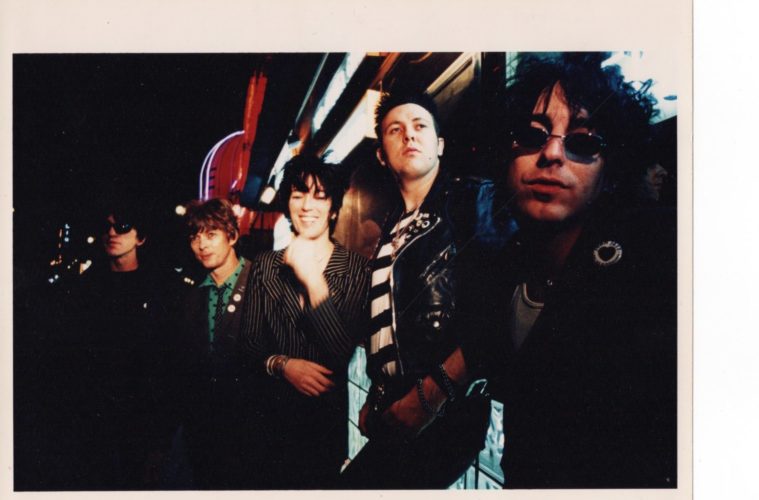
A Beat Angel Recalls a Weirdo Night: Brian Smith, frontman with rockers the Beat Angels, told us about his Weirdos experience.
Brian Smith: I was a boy. The records we’d hide under the sofa so our father wouldn’t see them; Sex Pistols, Stranglers, Dead Boys, Ramones, X-Ray Spex, Generation X, the Saints etc. I’d order Simpletones, Weirdos and Bags and 45s from Zed Record’s in Long Beach, money nicked from my big brother’s secret busboy tips. As far as I could tell me and my little brother were the only kids in Tucson, Arizona into punk rock in the late ’70s. I’d get threatened and punched at school for ever admitting such a thing. (High school didn’t last, I soon bailed sophomore year.) It was a different world.
I got in to see the Weirdos in a shit-kicker cowboy bar in Tucson called Tumbleweeds, where teens could roam freely and drink beer. Nobody seemed to care. My 12-year-old brother got in too, but he scaled the back-patio wall.
I owned the Weirdos’ Dangerhouse singles, played ’em to death, and the Who? What? When? Where? Why? EP on Bomp, which had just come out that year, and I was stoked.
When you’re a kid you assign sights, sounds and tastes to polar positions, usually great or shit, often based on your first impressions in the world. Lord knows they hang with you. The Weirdos were absolute greatness.
They kind of hobbled to stage in an air of otherworldliness, the blend of spiky-haired glam, old Barrymore Hollywood and A Clockwork Orange. Half of the 50 or so people there crammed to the stage, me and my brother front and center, a few feet from the band. You could smell their sweat. The alcoholic cowboys and street-urchin regulars hung back, laughing.
For 40 minutes, the Weirdos blasted a tense threshold and nobody could look away. It’s where beauty and ugliness simultaneously collided; singsong melody and sonic muscle, art and chaos, and lip-curl satire (were they skewing high-art pretenses, New York and London, and punk rock? I didn’t know. Still don’t.) The songs and performance showed requisite awareness to the greater, unreachable things in the world, not only an exposure to the forbidden but access to things I could only dream of, a detached boy in a provincial sun-drenched cowboy town sealed off by the Sonoran Desert. It was the access I was after, and they offered a head-bending, bittersweet taste of it, mostly visceral, at once a mix of the cosmopolitan worldliness, and a low-brow street hassle with the intelligence and musical language to define it. It produced an uneasy, undying longing in me, which set a tone for my relationship to music (and books) for the rest of my life. I soon recognized that “It” quality in the greats I would discover later. Did Miles Davis have it? Check. Tim Hardin? Of course. Esther Phillips? Dude. Redd Kross? Indeed.
Dix Denney’s guitar, held together with pieces of duct tape, jacked a wall of harmonic distortion and chordage, the rhythm section the aural equivalent of a steam locomotive, chugging in that sweet-spot cadence. Singer John Denny slithered, preened and leapt, a kind of mad street vaudevillian, there only to fucking entertain you. Was there a better singer and frontman in rock music? No. He would back a good 10 inches off the mic, “Hap-Hap-Hap-Hap-Happy People,” all lungs and neck-pop veins, and, incredibly you could hear that booming baritone over the stage and PA volume, and it was gigantic. Over the years, I’ve seen, and performed at, thousands of shows, big and small, never have I seen a frontman match Denney’s stage aplomb. It was a band of complete, unquestionably great, musicians too, a package so perfect as to be completely overlooked in the mainstream. When they launched into “We Got the Neutron Bomb,” and I believed them, it was in their eyes.
The band frightened me; too heady, too massive, too beautiful, and therefore furthered a challenge for me to do something. Music should land suckerpunches straight to the gut and the heart, and theirs stung hard, down to Dix’s guitar left leaning at full volume against his Marshall amp at show’s end, squealing into the desert night.
A Beat Angel Recalls a Weirdo Night: The Beat Angels’ The Gutter Snobs is the previously unreleased third album from 2001, reissued last month on Drastic Plastic and produced by Gilby Clarke. Brian Smith is also the author of the novel-in-stories Spent Saints and the essay collection Tucson Salvage.
Advertising disclosure: We may receive compensation for some of the links in our stories. Thank you for supporting LA Weekly and our advertisers.

